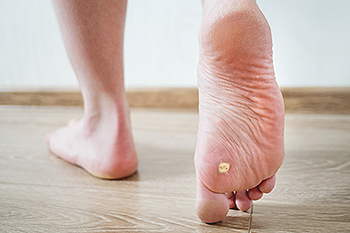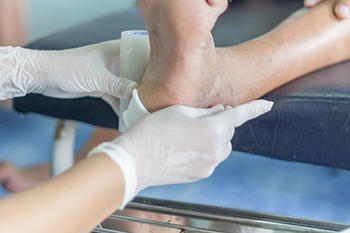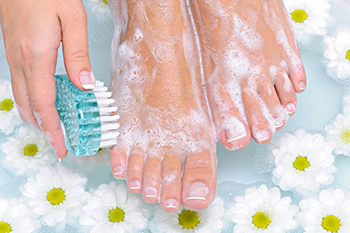Connect With Us
Blog
What Is a Plantar Wart Caused By?

Warts are growths that can form on various parts of the body. Plantar warts develop on the soles of the feet and grow inward as a result of the weight the feet endure. They generally cause severe pain and discomfort, and walking may become difficult. A wart is caused by the human papillomavirus (HPV), and plantar warts are no different. They can have the appearance of a callus, with small black dots in the center. This particular virus lives and thrives in warm and moist environments, including shower room floors and public swimming pools. It can enter the body through small cuts in the skin on the feet, and it is beneficial to wear appropriate shoes while in these areas. Additional preventive methods consist of keeping the feet as dry as possible, and refraining from sharing towels, shoes, and socks. There are various treatments that can be effective, and it is advised that you consult with a podiatrist who can determine what the best one is for you.
Plantar warts can be very uncomfortable. If you need your feet checked, contact one of our podiatrists from Foot & Ankle Associates of Maine. Our doctors will assist you with all of your foot and ankle needs.
About Plantar Warts
Plantar warts are the result of HPV, or human papillomavirus, getting into open wounds on the feet. They are mostly found on the heels or balls of the feet.
While plantar warts are generally harmless, those experiencing excessive pain or those suffering from diabetes or a compromised immune system require immediate medical care. Plantar warts are easily diagnosed, usually through scraping off a bit of rough skin or by getting a biopsy.
Symptoms
- Lesions on the bottom of your feet, usually rough and grainy
- Hard or thick callused spots
- Wart seeds, which are small clotted blood vessels that look like little black spots
- Pain, discomfort, or tenderness of your feet when walking or standing
Treatment
- Freezing
- Electric tool removal
- Laser Treatment
- Topical Creams (prescription only)
- Over-the-counter medications
To help prevent developing plantar warts, avoid walking barefoot over abrasive surfaces that can cause cuts or wounds for HPV to get into. Avoiding direct contact with other warts, as well as not picking or rubbing existing warts, can help prevent the further spread of plantar warts. However, if you think you have developed plantar warts, speak to your podiatrist. He or she can diagnose the warts on your feet and recommend the appropriate treatment options.
If you have any questions please feel free to contact our office located in Brunswick, ME . We offer the newest diagnostic and treatment technologies for all your foot and ankle needs.
Two Types of Foot Wounds

An open wound that develops on the foot can happen from an external or internal injury, which causes the tissue to become exposed to the outside environment. The two categories of wounds are classified as open or closed. The tissue damage that happens under the skin is a closed wound, and a bruise is an accurate example of this. Exposed tissue represents an open wound and can happen from a fall, surgery, or sudden trauma. Open wounds generally require prompt medical attention from a podiatrist who can stop the bleeding and clean the wound, followed by possibly treating it with antibiotics. The wound may heal faster when a proper dressing is applied and is frequently changed. If you have a wound, it is strongly advised that you contact a podiatrist who can effectively treat wounds on the feet.
Wound care is an important part in dealing with diabetes. If you have diabetes and a foot wound or would like more information about wound care for diabetics, consult with one of our podiatrists from Foot & Ankle Associates of Maine. Our doctors will assess your condition and provide you with quality foot and ankle treatment.
What Is Wound Care?
Wound care is the practice of taking proper care of a wound. This can range from the smallest to the largest of wounds. While everyone can benefit from proper wound care, it is much more important for diabetics. Diabetics often suffer from poor blood circulation which causes wounds to heal much slower than they would in a non-diabetic.
What Is the Importance of Wound Care?
While it may not seem apparent with small ulcers on the foot, for diabetics, any size ulcer can become infected. Diabetics often also suffer from neuropathy, or nerve loss. This means they might not even feel when they have an ulcer on their foot. If the wound becomes severely infected, amputation may be necessary. Therefore, it is of the upmost importance to properly care for any and all foot wounds.
How to Care for Wounds
The best way to care for foot wounds is to prevent them. For diabetics, this means daily inspections of the feet for any signs of abnormalities or ulcers. It is also recommended to see a podiatrist several times a year for a foot inspection. If you do have an ulcer, run the wound under water to clear dirt from the wound; then apply antibiotic ointment to the wound and cover with a bandage. Bandages should be changed daily and keeping pressure off the wound is smart. It is advised to see a podiatrist, who can keep an eye on it.
If you have any questions, please feel free to contact our office located in Brunswick, ME . We offer the newest diagnostic and treatment technologies for all your foot care needs.
Do Your Child's Feet Hurt?
Basic Hygiene for Healthy Feet

Even though our feet carry us throughout the day, they are often neglected when it comes to hygiene. Experts agree that many diseases and foot conditions can be prevented if you take care of your feet. Recommendations include doing simple tasks, like washing and drying the feet daily, keeping toenails trimmed straight across and not cut too short, and changing your socks each day. It is also recommended that shoes fit properly and be alternated to give them a chance to air out and help ward off bacterial infections. Of utmost importance to warding off infections is careful and frequent monitoring of cuts, sores, and bruises on the feet and toes. Special attention should be placed on the soles of the feet, which are hard to see and often forgotten. Several conditions directly related to foot hygiene are fungal infections like athlete’s foot, nerve and blood flow problems caused by diabetes, and ingrown toenails. For more information on proper foot hygiene, please consult a podiatrist.
Everyday foot care is very important to prevent infection and other foot ailments. If you need your feet checked, contact one of our podiatrists from Foot & Ankle Associates of Maine. Our doctors can provide the care you need to keep you pain-free and on your feet.
Everyday Foot Care
Often, people take care of their bodies, face and hair more so than they do for their feet. But the feet are a very important aspect of our bodies, and one that we should pay more attention to. Without our feet, we would not be able to perform most daily tasks.
It is best to check your feet regularly to make sure there are no new bruises or cuts that you may not have noticed before. For dry feet, moisturizer can easily be a remedy and can be applied as often as necessary to the affected areas. Wearing shoes that fit well can also help you maintain good foot health, as well as making it easier to walk and do daily activities without the stress or pain of ill-fitting shoes, high heels, or even flip flops. Wearing clean socks with closed shoes is important to ensure that sweat and bacteria do not accumulate within the shoe. Clean socks help to prevent Athlete’s foot, fungi problems, bad odors, and can absorb sweat.
If you have any questions please feel free to contact our office located in Brunswick, ME . We offer the newest diagnostic and treatment technologies for all your foot and ankle needs.

